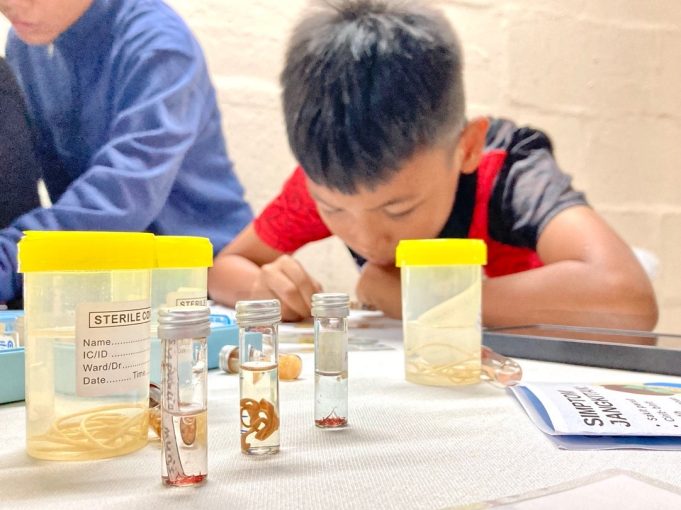By Nabila Abu Bakar
‘WHO, what, when, and why should one be concerned with taking a deworming
tablet?’. This was the quest I took over the last 3 years as I embarked on my PhD
research. Although intestinal parasitic infection has been on a decline over 3
decades in the country, infections continue to persist, particularly among vulnerable
communities. My quest took me to a community often missed, which was the
residents of low-cost public housing in the Klang Valley.
The urban parasite problem
When we talk about urban living, we often envision modern infrastructures and
complete amenities within the hustle and bustle of city life. Yet beneath this fancy
façade lies an unsettling public health concern: intestinal parasitic infections (IPIs).
These infections, often associated with rural and impoverished settings, are still
lurking around the urban population, affecting about one in five people.
Despite modern facilities, urban areas are not immune to the factors that facilitate
IPIs. Indiscriminate waste management, overcrowding, and poor sanitation practices
are rampant in low-cost housing areas like Projek Perumahan Rakyat (PPRs),
contributing significantly to the infection statistics. Recent studies showed that the
common parasites that infect urban Malaysians are roundworms (Ascaris
lumbricoides) and whipworms (Trichuris trichiura).
As it turns out, this infection does not discriminate against any gender, age, or ethnic
group. However, children and residents of low-cost housing projects are at a greater
risk of infection due to their abject living conditions and lack of civic mind-ness.
Once, during an engagement with residents from one of the PPRs in Klang Valley,
and as I made my way back to my car, I was showered under a stream of curry
sauce after being carelessly thrown out from one of the flats. Very few people could
claim such an experience, I reckon. On another engagement, a bottle of Vitagen
dropped on my head. Again, very few people could make such a claim.
Sadly, this is the harsh reality of today’s many PPRs. It is very common to see
rubbish and waste littered (and flying) around their vicinity. High-rise dumping, where
unwanted furniture and waste are thrown from the upper floors to the ground, is
rampant. Such practice creates a very conducive environment for pests like rodents
and wild animals to thrive, as well as tragic deaths due to accidents involving
discarded heavy furniture.
The waste collection facilities in these PPRs are also in poor condition and cannot
accommodate the amount of waste generated by the residents. As a result, the
facilities overflow, forcing residents to discard their waste willy-nilly. This scenario
fuels the persistence of intestinal parasites in urban settings, compounded by the
lack of understanding of the etiology of the infection among urban inhabitants.
Our modern diet of undercooked meat and fish, sushi, raw vegetables, and
unwashed fruits also increases the risk of infection, as microscopic parasitic eggs
and/or larvae might be present without us realising it.
A push for change
For the last few years, we have been working closely with PPR residents across
Klang Valley to better understand why this infection persists despite basic facilities
being provided. As a result, we developed a community-based intervention program
called “Bersama Mencegah Jangkitan Parasit,” or CEGAH JaP for short, supported
by the Fundamental Research Grant Scheme (FRGS/1/2020/SKK0/UM/02/18) under
the Malaysian Ministry of Higher Education, and ThinkCity’s Kita-Untuk-Kita (K2K)
Community Grant.
This pilot program was introduced to residents from 3 different age cohorts with fun
and engaging activities that incorporate basic knowledge about the causes, risk
factors, and preventive measures of IPI with commonly played games like Bingo,
musical chairs, and charades. Gross specimens of the parasites were also exhibited
to help the participants better grasp the gravity of the infection more effectively and
how easy it is to avoid infection with better hygiene practices.
This creates a more laid-back and casual manner for the participants to learn new knowledge without the pressure of a traditional classroom setting. Results have been surprising, with more than 70% of participants improved their understanding of the subject.
Often, intestinal parasitic infections are asymptomatic and go undetected for years.
However, they can cause general fatigue and tiredness, which are frequently
overlooked and affect our quality of life. Us humans, we are a forgetful lot. We forget to make our health a priority until it’s too late. When it comes to intestinal parasitic infections, an annual RM10, 400mg albendazole is sufficient to eliminate any possibility of infection.
Hence, I ask you this: When was the last time you took a deworming tablet?
 The author is currently a 4th Year PhD student at Universiti Malaya. Her research centred around neglected tropical diseases, including intestinal parasitic infections amongst residents of PPRs in Klang Valley, Malaysia.
The author is currently a 4th Year PhD student at Universiti Malaya. Her research centred around neglected tropical diseases, including intestinal parasitic infections amongst residents of PPRs in Klang Valley, Malaysia.

















